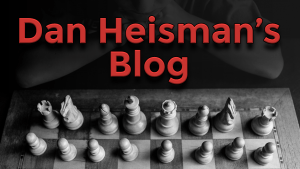Q&A with Coach Heisman Aug 17, 2013
On today's show the great majority of questions involved getting better at chess, and most involved openings (with a smattering of endgames thrown in). I think many players have this "improvement model" in their head where they memorize an opening book here, throw in an endgame book there, and that's how one improves. In general, it doesn't work like that, at least not for most very strong players. Someone did mention The Improvement Feedback Loop.
I have tested about 1,000 players on various aspects of the game, including endgames. Most are not weak at endgames because they don't read enough endgame books and don't know the Lucena position. They are weak at endgames primarly because:
- They think a slow game is one where each player gets 15-20 minutes for the entire game. That would leave about 30 seconds per move, less if there's a long endgame. You don't learn how to analyze properly at such short time controls,
- Many players generally "Hand-wave" endgame positions (try to play by principle and pattern recognition rather than carefully analyze). When I give them a typical endgame problem they don't analyze it carefully, but try to deduce the answer from either general principles or just looking 3-5 ply deep (which is plenty deep for most positions before the endgame but rarely enough in a typical late endgame position),
- They rarely play lots of endgames slowly against good competition and then analyze those endgames with their opponents and stronger players, and
- They don't play over a multitude of annotated master games, many of which get to the endgame and thus have the author carefully explain what is happening.
Same thing with openings. I get a ton of "Is X a good opening?" questions and, as always, recommend the questioner check out my Chess.com blog What's a Good Opening? Without repeating myself, here are two articles I have written about learning openings, which should make very helpful reading for anyone interested in my suggestions:
1. Learning Opening Lines and Ideas,
Similarly, I get asked if I "like" an opening. I guess this is a compliment because if I like the Catalan and Gruenfeld and dislike the Benoni and Caro Kann that is supposed to carry some weight. However, which openings I choose (and, to an extent, therefore I "like") has little bearing on what grandmasters or computers think are the best lines nor should either have that much bearing on which lines you might like to play.
In my experience I found that very few players do what I did fairly religiously when I started: look up most games I ever played (especially speed games) in MCO-10 and ask "If I had to play this opening again and my opponent played exactly the same, where would I improve?" Today, with much more extensive opening information (books and databases) and terrific engines, it's even much easier. Don't make the same mistakes over and over.
For a complete list of my articles and columns on openings, take this link.
One questioner asked why it took so long for Magnus Carlsen to get a shot at the World Championship when he clearer deserved one long ago. This question could mean one of two things:
1. Why is there such a long gap between the Candidates (which Carlsen won) and the actual match? (It's unlikely this is what he meant), or
2. Why didn't FIDE select Carlsen as the World's clear #1 and let him play for the World Championship before 2013? I think that's what he meant, so let's answer:
Before 1948, when FIDE ran their first World Championship, the World Champion (Steinitz, Lasker, Capablanca, Alekhine, Euwe) got to "hand-pick" his challenger. Since then FIDE has always picked the challenger thru a qualifying "cycle". In the cycle that ended a couple years ago, Carlsen was already #1 on the rating list, but FIDE's "short-match knockout" format was quite amenable to upsets. In other words, it was very likely the best player would not win. For that reason, Carlsen complained to FIDE that their methodology was not fair (I agreed), and that he wasn't going to play (I sympathized, but Carlsen's choice was not the way to become World Champion).
In the next FIDE World Championship cycle, the one just completed, the rules were much more conducive to letting the cream rise to the top and Carlsen played - and won - but just barely, in one of the most exciting tournament finishes ever. So he will challenge Anand in a World Championship match this fall. I fully expect Carlsen to win, even though Anand has the "home court" advantage by playing in India.
A questioner asked when it was OK to develop the queen. I warned against relying on a principle like "Don't bring out the queen too early", as the word "too" is self-defining, i.e., any time the queen comes out and its bad, it's thus too early, and if the queen development is good, then its not! I could say the same about taking in too much air, water, or doing too much homework  . I noted that grandmasters tend to avoid the Center Opening 1.e4 e5 2.d4 exd4 3.Qxd4 because of 3...Nc6, yet in the Scotch after 1.e4 e5 2.Nf3 Nc6 they gladly play 3.d4 exd4 4.Nxd4 when Black shuns 4...Nxd4 5.Qxd4 and the white queen stands well, since there is no good way to attack it. If you understand why the Center Opening is unpopular and yet 4...Nxd4 in the Scotch is also rarely played (i.e. the relative safety of the white queens on d4), you are well on your way toward figuring out when to "expose" the queen (In Classical Development the queen is often developed after you castle and your minor pieces are activated). The actual move number where you properly can develop your queen is similarly relative to the position; surely after 1.f3 e5 2.g4 Qh4# (Fool's Mate), the queen is not out "too" early
. I noted that grandmasters tend to avoid the Center Opening 1.e4 e5 2.d4 exd4 3.Qxd4 because of 3...Nc6, yet in the Scotch after 1.e4 e5 2.Nf3 Nc6 they gladly play 3.d4 exd4 4.Nxd4 when Black shuns 4...Nxd4 5.Qxd4 and the white queen stands well, since there is no good way to attack it. If you understand why the Center Opening is unpopular and yet 4...Nxd4 in the Scotch is also rarely played (i.e. the relative safety of the white queens on d4), you are well on your way toward figuring out when to "expose" the queen (In Classical Development the queen is often developed after you castle and your minor pieces are activated). The actual move number where you properly can develop your queen is similarly relative to the position; surely after 1.f3 e5 2.g4 Qh4# (Fool's Mate), the queen is not out "too" early  .
.
A couple of viewers asked about the chess cup I use for "Breathe Deep" tea (the toughest thing about the show is often talking for 90 minutes straight - try it sometime!). I got it from the USCF many years ago, but I am happy to say our Dan Heisman Learning Center store here via Chess.com sells similar material, and all the net proceeds go to a charity I started, the Chess Support Fund at The Philadelphia Foundation.
A question was "How much do you get paid?" That's a pretty open-ended question, so I replied:
- My wife pays me nothing when I take out the trash.
- Ditto for walking the dog.
- My lesson fees are always public at my website.
- As for how much I get paid to do the show, only Chess.com is at liberty to divulge, but I suspect they would not. Probably somewhat less than Howard Stern gets for any of his shows...
One of our Chess.com's Learning Center admins asked how we could make our Team Chess (that's not consultation; it's like the teams at the US Amateur Team Championships) a better product. Unfortunately I was not aware of all the current rules, so I could not make an intelligent suggestion on the show, but I did offer to discuss it with anyone later over the phone if I could be of help.
A viewer question was "How did Bobby Fischer get good at chess?" One good source is Profile of a Prodigy by Frank Brady (who also wrote the sadder follow-up Endgame). Bobby liked to tell everyone that "he did it all himself", but he had the privilege to go to NM John Collin's home most every day after school and analyze with some of the country's top players, such as GM William Lombardy. Then he studied like crazy at home, was a member of the prestigious Manhattan Chess Club, and played in every big tournament he could. See Collins' book My Seven Chess Prodigies (including my coach, Donald Byrne).
This show marked over 1 year of doing "Q&A with Coach Heisman", which started early August 2012. Thanks to viewers for all the support and questions, and thanks to the mods for helping with each show. The next show, on the 31st, will be open to Diamond and Platinum members.



